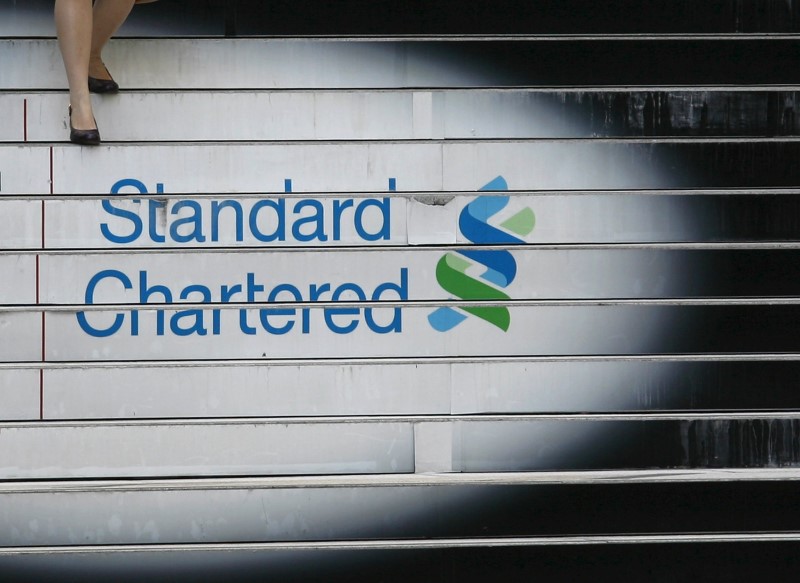By Lawrence White and Steve Slater
HONG KONG/LONDON (Reuters) - Standard Chartered (L:STAN) plans to axe 15,000 jobs and raise $5.1 billion by selling new shares as its new chief executive set out a plan to restore profitability after three years of falling profits and strategic mistakes.
The bank, regarded as one of the 30 most important in the world, will cut 17 percent of its workforce to help save $2.9 billion by 2018, and sell or restructure $100 billion of loans, or a third of its total.
CEO Bill Winters, a former JPMorgan (N:JPM) investment bank boss who took the helm of Standard Chartered in June, described the move as an "aggressive and decisive set of actions" to shore up the bank, which makes two-thirds of its profits in Asia.
Winters is one of a handful of new European bank CEOs - including at Credit Suisse (VX:CSGN), Deutsche Bank (DE:DBKGn) and Barclays (L:BARC) - who must push through big restructuring plans to cut costs and improve profitability in the face of a tougher regulatory landscape, which has made many banking activities unprofitable.
Standard Chartered's problems were laid bare by news of a third-quarter operating loss of $139 million, weighed down by growing global regulatory costs and rising losses on loans in India. Revenue slumped 18 percent year-on-year.
It was the fifth successive quarter of falling revenue for the bank. Before the results, analysts had expected it to report a $2.9 billion profit this year, compared to $7.5 billion in 2012 - the year when many of its troubles began.
The bank was fined $667 million that year for breaking U.S. sanctions related to Iran, and New York's powerful banking regulator called it a "rogue institution". More trouble followed related to strategy, execution and governance, and previous CEO Peter Sands was ousted and replaced by Winters.
Standard Chartered remains under investigation. Winters said Britain's Financial Conduct Authority has two open probes into the bank's monitoring of sanctions and anti-money laundering compliance.
U.S. authorities are also still investigating transactions involving Iranian clients, including whether the bank still had Iran relationships when it signed its 2012 settlement.
Its London-listed shares were down 8.9 percent at 650.4 pence by 1141 GMT, the worst-performing stock on the European bank index. They have slumped 32 percent this year, partly due to expectations Winters would launch a rights issue and also on the Asian slowdown.
Major shareholders welcomed the moves to arrest the slide.
"Standard Chartered's management is taking the right steps to address the bank's problems. The plan outlined seems sensible and it is clear where the bank now wishes to focus its business," said Hugh Young, managing director of Aberdeen Asset Management Asia.
Aberdeen is the bank's second biggest shareholder with a near 9 percent stake, and Young said it would support the rights issue. Singapore investment company Temasek, the bank's top shareholder, said it intends to take up its full allocation of the issue, representing 15.8 percent of shares.
STAYING IN LONDON
The rights issue, StanChart's first capital-raising in five years, will be launched on Tuesday at a price of 465 pence per share, a 35 percent discount to its last traded price in London. Two new shares will be issued for every seven existing shares.
"Post restructuring and recapitalisation Standard Chartered will be a stronger and more focused group. But the group will remain a complicated work-in-progress during the upcoming years," said Ronit Ghose, analyst at Citi.
Winters said he had no plans to add to that complexity by considering moving headquarters away from London. Its rival HSBC is considering relocating.
"It's absolutely not a priority for us right now. We have an enormous execution agenda and we find the UK to be a very pragmatic and predictable place to do business," Winters told reporters on a conference call.
Standard Chartered said it would not pay a final dividend for this year, saving the company $700 million.
The capital-raising and asset-restructuring will together push the bank towards a new common equity tier-1 capital (CET1) ratio goal of 12-13 percent, according to the company.
The bank's current CET1 ratio - a measure of financial strength - dipped to 11.4 percent at the end of September and will rise to 13.1 percent after the rights issue.
Analysts had expected Winters would wait until after Bank of England stress test on Dec. 1 before announcing a rights issue. The bank said the regulator was aware of the bank's plans and had not objected.
Standard Chartered has already cut 4,000 staff this year, and Winters said about 1,000 senior staff, or a quarter of the top ranks, had already been told they would go. He said he hoped most other cuts would be made in areas where there was a high natural attrition.
The sale or restructuring of $100 billion of risk-weighted assets includes $20 billion of big loans to individual borrowers that Winters said were outside the bank's "risk tolerance" and would be liquidated.
He plans to further restructure the troubled business in Korea, reposition its activities in Indonesia and shed assets in commercial and investment banking. The bank will also reduce its retail operations in second and third-tier cities where it currently has a presence.

The restructuring will cost $3 billion and Winters said he also plans to invest more than $1 billion over three years to improve its retail and private banking business, Africa, and to enhance controls.